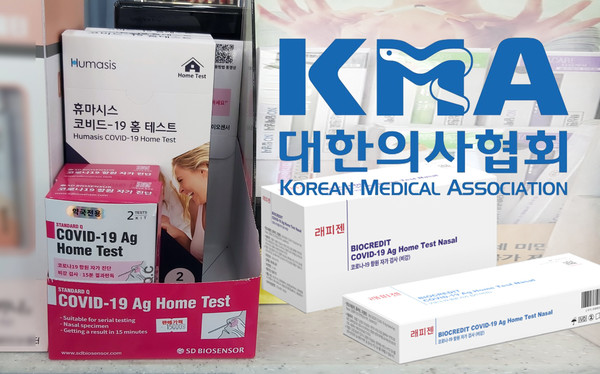The Korean Medical Association (KMA) said the health authorities should restrict the general public's use of Covid-19 home test kits.
The doctors' group said that reckless use of self-test kits partially contributed to the continuing spike in Covid-19 cases despite the strictest Level 4 social distancing rules.

Health experts have repeatedly criticized rapid antigen home tests because of the devices' low sensitivity and high probability of false-negative results.
On Tuesday, the KMA's Covid-19 response committee said, "We confirmed the problem with the misuse or abuse of rapid antigen test devices when we reviewed the cause of the fourth wave of Covid-19," in a statement.
In the statement, the KMA's Covid-19 committee recommended that only medical institutions use rapid antigen test kits for symptomatic people.
People with difficult mobility, those in remote villages, and prisoners could use self-test devices in particular situations, the KMA said. However, the sample collection, testing, and interpretation of the result must be made with the guidance and supervision of medical professionals, it emphasized.
Also, the KMA advised against the general public's use of rapid antigen test devices.
"The self-test kits can make a loophole in the quarantine system because people have issues with sample collection, make testing mistakes, read wrong results, have false relief after testing, and cause secondary damage due to the misuse of the test kit," the KMA's Covid-19 response committee said.
The KMA said a rapid Covid-19 home test could show a lower sensitivity if a non-medical person collects samples compared to a medical professional's sample collection.
According to a study by the U.S. Centers for Disease Control and Prevention (CDC) that involved self-collected nasal specimen PCR tests, the sensitivity among asymptomatic people was 50 percent, versus 87 percent among symptomatic people, out of 730 participants.
In another study on 1,076 subjects, the sensitivity among asymptomatic and symptomatic people was 44 percent and 62 percent, respectively.
Rapid antigen test kits showed low sensitivity even in samples collected by doctors.
The Korean Society for Laboratory Medicine (KSLM) verified that quick antigen test kits were estimated to have a 41 percent sensitivity in the general population.
Another study by the Seoul National University Hospital showed that rapid tests had a 17.5 percent sensitivity among patients who visited the emergency center.
These results were from nasopharyngeal smear samples collected by healthcare workers.
"The best study to evaluate the performance of a self-test kit is a prospective study comparing it with the standard test one-on-one in real situations, and it has already been reported that self-test kits showed low sensitivity in asymptomatic people," the KMA said. "In countries where Covid-19 cases are relatively small, like Korea, there may be a serious decrease of sensitivity."
As the health authorities use the term "test kits" for low sensitivity detection methods, it is worrisome that many people, including those without symptoms, use them widely, the KMA said.
The authorities should distinguish Covid-19 home test kits from pregnancy tests because the former involves a highly contagious disease, it added.
"Letting Korean individuals use a rapid test kit to diagnose an infectious disease like Covid-19 is like tossing responsibility and financial burden to individuals for reading the results and taking future actions," the KMA said.

